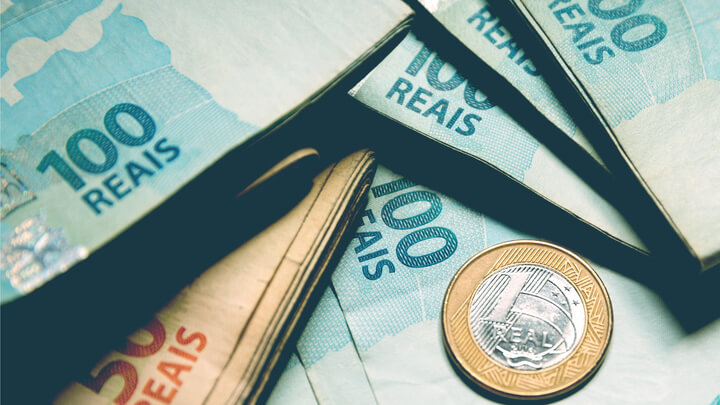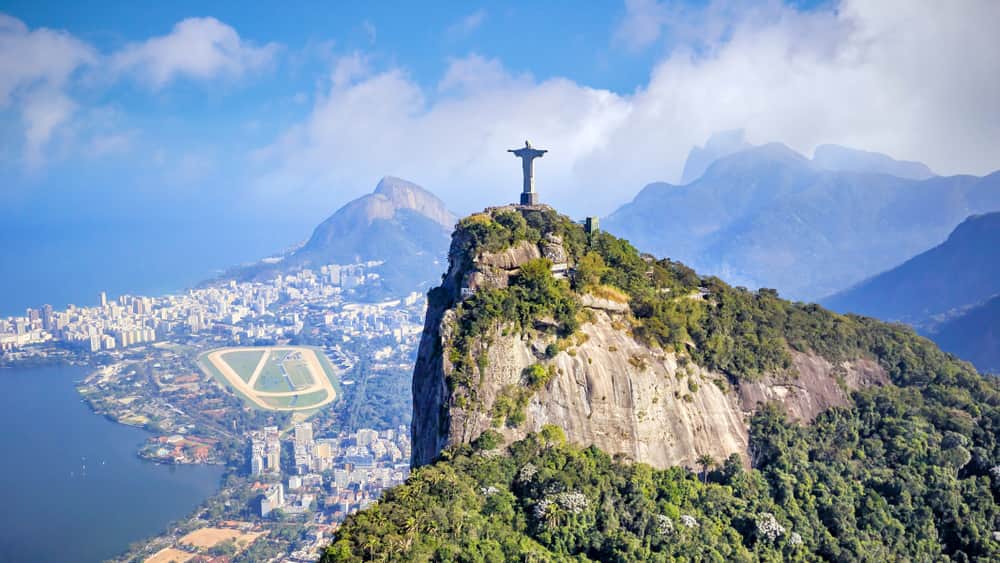ATMs in Brazil: locations, fees, and tips
Read our essential guide to ATMs in Brazil, including how to find them, fees, exchange rates, withdrawal limits and more.

Brazil has a lot to offer visitors. Since hosting the Football World Cup in 2014 and the Olympics in 2016, travellers from all over the world have arrived, wanting to know more about the land of Capoeira and Carnaval.
There’s no shortage of things to do in Brazil (it’s the fifth largest country in the world, after all), but a trip there is going to cost you.
To prepare you for what’s in store, this guide tells you all you need to know about banks and money in Brazil.
The currency in Brazil is the Real (the plural of Real is Reais). You will quickly notice that the pronunciation of these words is not exactly straightforward - ‘Real’ sounds more like ‘Hey-al’, and ‘Reais’ is ‘Hey-ice’.
Other currencies aren’t widely accepted in Brazil, so you will definitely need to exchange some cash to get by.
| Real Symbols | BRL, R$ |
|---|---|
| 1 BRL | Each Real is divided into 100 Centavos. |
| BRL coins | Coins are issued in denominations of 5, 10, 25, and 50 Centavos, and also R$1. |
| BRL banknotes | Banknotes in circulation are in denominations of 2, 5, 10, 20, 50 and 100 Reais. |
Most of the banknotes are printed on paper, but some commemorative notes have been made in polymer, so you might notice a difference. Both paper and polymer notes are legal tender. The banknotes have pictures of Brazilian flora and fauna, and are differently sized with bigger notes used for larger values.
The general consensus from frequent travellers to Brazil is that changing your money when you’re there is better than changing before you travel. However, it’s a good idea to decide where you will change your money ahead of time - exchange rates change on an hourly basis.
If you’re uncomfortable about arriving with no Reais in your pocket, then change a small amount at home (some exchange services will need advance notice to allow you to buy Reais so check before you go). You can then exchange the rest of the money you’ll need once in Brazil. Or even better, use an ATM in the airport to withdraw R$.
As a general rule, the exchange desks situated in airports are not a great value. They pay high rent to be there, and pass that margin onto the customer in the poor exchange rates they offer. The same goes for exchange services in your hotel. As convenient as they are, the rates will usually be poor and include high fees. Avoid these where possible.
Whether you're changing your cash at home or in Brazil, you need to be wary of excessive fees, which will not always be disclosed to you upfront. Even if a service claims to charge no commission, they will be charging you extra money somewhere. Often, the profit they make is wrapped up as a hidden fee in the exchange rate they give consumers.
You can make sure you don’t get ripped off on the currency exchange by ensuring you understand the mid-market rate. This is the only real exchange rate, quoted in its purest form without any added commission. Find out the mid-market rate by using an online currency converter, and use this rate as a benchmark to compare the fairness of offered tourist rates.
Finally, if you do decide to bring hard cash and exchange it in Brazil, make sure that you carry only clean, crisp notes. Any that are damaged may be refused by the exchange service.
Traveller’s Cheques are not accepted as a form of direct payment in Brazil. Although you can exchange them in some banks or hotel front desks, they will incur heavy fees and might mean that you have to hang about waiting in line in a busy bank branch. Not the best way to spend your time!
Because the rates are not usually great compared to exchanging cash, many travellers have abandoned the Traveller’s Cheque in favour of a mixture of ATM withdrawal, card payment and hard currency.
Credit and debit cards are widely accepted in Brazil, with coverage on all the major networks. However, it’s good to note that many small stores, cafes, markets, as well as spots outside of the city don’t allow card payments, so it’s important that you carry some cash.
If you’re planning to use your cards abroad, let your card provider know ahead of time so that they don’t block your card while you’re overseas.
If you use a credit or debit card while you travel, you might be asked if you want to be charged in your home currency. This is called Dynamic Currency Conversion (DCC). With DCC you can choose to see the cost of the transaction expressed in your home currency at the point of payment. It sounds good, but this leaves you exposed to hidden fees, as the exchange rate used will not be favourable. That’s because it is assigned by the payment platform instead of your home bank. To get a fairer rate, always opt to pay in the local currency instead.
ATMs are common in major cities and towns, but may be more difficult to find in the countryside. Be aware that many ATMs are located behind a lockable door that closes overnight for security. Plan ahead to avoid being caught without cash late in the night.
To find the nearest options for you, you can use these ATM locators:
It’s worth experimenting with your bank cards to find one that works. Some ATMs don’t accept foreign cards, and at times ATMs might run out of currency until they are restocked. For this reason, finding a functional cash machine on a weekend or public holiday can be tricky.
Although your bank and the ATM may well charge a fee on your withdrawal, this is still a more economical way of getting cash. Check with your home bank to understand the charges they add to your foreign ATM withdrawals. Many ATM screens also show which fees are applied at the end. Because different banks add different fees, shop around. Or, for an even better deal, if your home bank has a partnership with a local bank in Brazil, you may be able to use these ATMs at a reduced rate - just check with them before you hop on the plane.
Finally, be sure to avoid DCC (explained in the last section) at ATMs. If you're asked if you want to be charged in your home currency, say no. Always select to be charged in local currency, to get the best bank rate. This can be worded in different ways, so be aware of your options and avoid having the ATM apply its own conversion rate to the transaction.
Brazil has a comprehensive banking network with some huge homegrown banks covering the entire country and branching out into the broader region. State-owned banks also play a prominent role. The largest and most common banks are listed below, although other banks cover specific parts of Brazil, so you may see some variety on your travels.
If you’re headed for Brazil it’s a good idea to ask your home bank if they have any partnerships with Brazilian banks. If they do then you might be able to use some services (such as ATM withdrawals) for free while you’re there.
If you’re going to be staying in Brazil for awhile and need access to your money abroad, use Wise, for low and transparent fees. If you have a bank account in Brazil, or know someone who does, you can transfer money between bank accounts using the real mid-market exchange rate. It's a quick and convenient way to get your cash, with no hidden fees.
*Please see terms of use and product availability for your region or visit Wise fees and pricing for the most up to date pricing and fee information.
This publication is provided for general information purposes and does not constitute legal, tax or other professional advice from Wise Payments Limited or its subsidiaries and its affiliates, and it is not intended as a substitute for obtaining advice from a financial advisor or any other professional.
We make no representations, warranties or guarantees, whether expressed or implied, that the content in the publication is accurate, complete or up to date.

Read our essential guide to ATMs in Brazil, including how to find them, fees, exchange rates, withdrawal limits and more.

Check out our in-depth guide on everything you need to know about buying a prepaid Brazil SIM card, including different providers, pricing, and features.

Check out our handy guide to using PayPal in Brazil, including what fees you can expect.

A handy guide on how Revolut works in Brazil, including info for UK customers on using a Revolut card abroad.